Debunk-Tuesday – The Myth of Overpopulation
Guess who’s back? Back again. Ego’s back, tell a friend. Ahem. Ok, enough of my poor rap skills.
As promised two weeks ago, I’m back with full force (and much more to come). I have plenty of new ideas what to write about starting today with one of the most annoying myths I had to deal with in recent history: the world is overpopulated and will eventually perish because of too many living people. Of course, nothing could be further from the truth.
Facts vs. Fears
Fear is popular. Especially among politicians of every spectrum. The leftists and environmentalists are usually pointing out the many detrimental things, which are bound to happen, if the world’s population keeps increasing. Mother nature will slowly die a painful and horrible death, the peaceful and uncivilised natives of the rain forests will extinguish and in general, everything is going from bad to worse.
Right-wing politicians usually don’t care so much about the environment or indigene cultures, but far more about their own countries. They never get tired of pointing out the dangers of mass-immigration (no, I am not going to discuss this here, since this is a topic for a whole article or even a series of its own) and how problematic it is, that many people from low-income countries with high fertility rates move to a high-income country with low fertility rates. In the understanding of these politicians, people are not going to change at all, when their circumstances change. They will behave as they always have – not matter where they are and what they are dealing with. In addition to that, these people also tend to believe, that fertility rates are always high among some peoples and nothing could ever change that, hence we will have to deal with the consequences of overpopulation at some point. This is even more dramatic, if the highly fertile people move to civilised countries. Eventually, we will all die.
Or will we?
The main problem with these fears is their lack of evidence. I’m not denying that mass-immigration can cause several problems for the host country, if not managed properly. But, yet again, that’s a topic for another article. What I’m referring to is the absence of evidence for overpopulation and high or even increasing fertility rates and that people are not going to change, as soon as their lives are getting better.
Data, not feelings
One of my all-time-favourite websites is Our World in Data. There are arguably very few better sources for data regarding the current state of the world (maybe only matched by the CIA’s World Factbook and the UN’s data.). But surprisingly, even among students of social sciences these websites are rarely known and the very idea of the world getting better seems to be almost heretical. That was at least my observation during my studies, but I would not be surprised, if my biased experienced is very close to the truth.
Overly increased population

But let’s start with a definition. In their 2013s article Debunking the Myth of Overpopulation[1] the authors Anne Roback Morse and Steven W. Mosher defined overpopulation as follows:
Overpopulation describes a situation where the number of people exhausts the resources in a closed environment such that it can no longer support that population.
(CC BY-ND 3.0)
Focus on the important aspect: “resources in a closed environment”.
Lands, cities, the earth – they are not closed environments. Not at all. One simple example:
If the earth would be a closed environment, we could not use the sun for energy production or travel to space for a wide variety of research and probabilities of claiming new spaces (pun intended) to live at.
I highly recommend reading the cited article, since it’s a quick, but fun read and presents you the main ideas which I’m writing about in an easy digestible way.
There are, of course, a lot of other aspects to keep in mind, but more about them later.
First of all, we have to ask ourselves, why so many people believe the earth is a closed system with finite resources, which can only be harvested in an exploitable way.
There is mainly one guy to blame for that: Thomas Robert Malthus[2] and the model which occurred based upon his work – the Malthusian growth model[3].
This culminated into the famous equation:
with
P0 = P(0) is the initial population size,
r = the population growth rate
t = time.
To make sense out of that, it’s helpful to look at Malthus’ writings. He stated, that each creature’s population has the desire to grow exponential, as long as there are enough resources, hence the growth factor is mainly limited by the availability of resources.
If you read the article by Morse and Mosher I linked earlier, you already know why this is a far too simplistic view when it comes to human societies and their living conditions as well as population growth.
Why am I writing about resources, growth rates and closed environments, when I want to explain you something about overpopulation?
Because it’s important to understand these connections. I already explained, why the earth or its respective cities/lands are not closed systems. So, I will dig deeper into resources (and their availability) as well as current growth rates of human population.
You will see, humans are in fact very different from every other species inhabiting this beautiful blue planet.
Out-resourced
The resources humans currently need are manifold. Therefore, it would be way too much to list them and their availability just in one small pop-sci article. It is for this reason, I’m only concentrating my focus on the most important resources humans need for survival: food and water.
Food for everyone
One of the main arguments of fearmongering politicians and activists is the assumption, there is just not enough food to nourish a bigger human population. This is wrong.
Right now, we are producing enough food to feed 10 billion people(4). The problem is not so much about scarcity of food, but its distribution. Inequality of resource availability along with poverty and bad policies (e.g. corrupt governments in third world countries, wars, etc.) are the key factors when it comes to hunger and starvation. So even if the world’s population is suddenly increasing by another three billion (which is unlikely to happen soon, but more to it later) – we would have enough food to feed them, we just need to figure out how to actually do it.
Currently, a huge chunk of the produced grain crops is used for biofuels and feeding animals. So, it’s a bit questionable (if not outright hypocritical) to complain about the awful situation concerning food in third world countries, while your car runs on that very food. At some day, I will figure out how environmentalists can keep up with this form of cognitive dissonance.
At least, not all hope is lost. I told you earlier, the world is getting better, just many people don’t know about it.
During the last decades, the available food for consumption has increased in most countries(5). On average a man needs 2500 kcal/day and a woman 2000 kcal/day. These amounts vary of course, but it’s helpful to have a general idea about them while speaking about food.
Starting at the 18th century, German citizens, for example, had up to the post-world-war-II-era not much more calories per person available as countries like Ethiopia and Haiti have today.
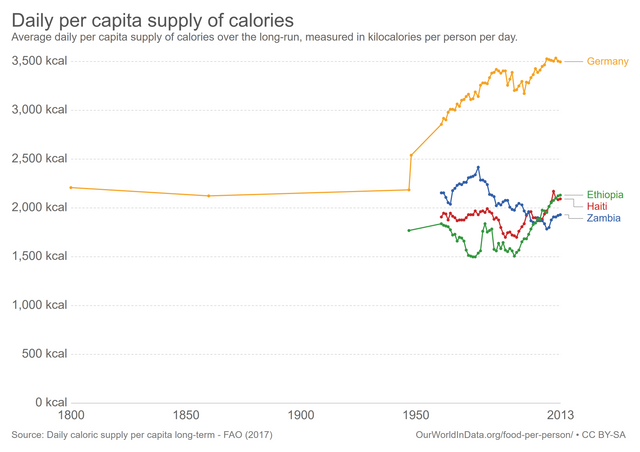
Judging from a global perspective, there is also an obvious trend towards more food for everybody. The disparity between the people on different continents regards the amount of food they have available is constantly decreasing.
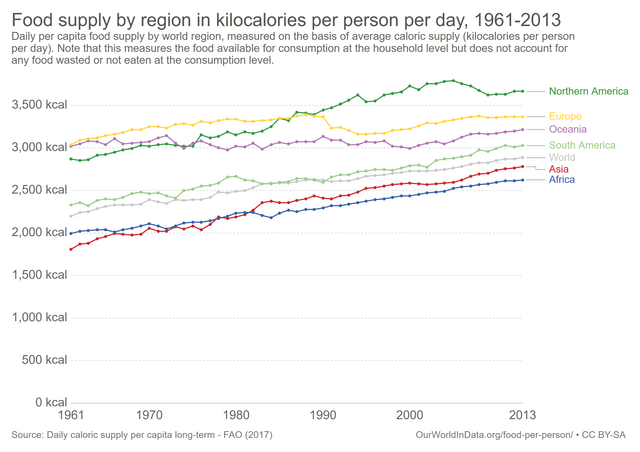
Of course, there are still over 800 million people suffering from hunger worldwide – that’s 800 million too much. But we should not lose the historical and global perspective. In about one or two generations, countries which formerly had relatively low calories per person per day are now among countries with almost no hunger at all. These things take time, but the pace of the current development seems to indicate, people’s living conditions are changing for the better – faster than ever before in human history. This is quite an achievement, we should always keep in mind.
Be water, my friend
When it comes to water, the trend is even more obvious(6). There, we only have to take a look at a 25-years-time-period, ranging from 1990 until 2015. Many different aspects are important regarding the access to clean, drinkable water, but for me, there’s especially one statistic very intriguing: the number of people who have access to an improved water source (like public taps, tube well or protected springs).
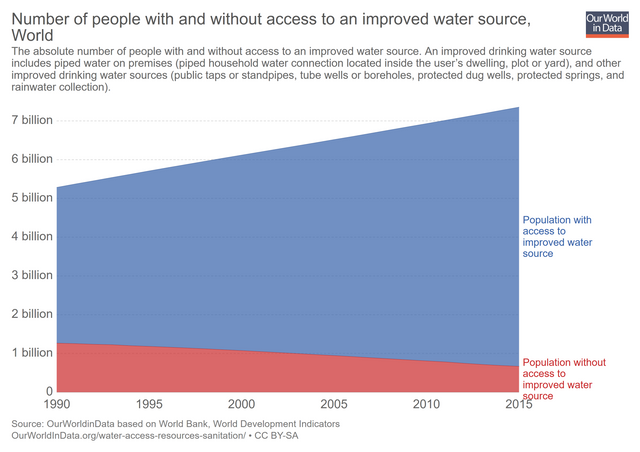
As you can clearly see, in 1990 1.26 billion people had no access to these improved water sources – but over 25 years this number decreased to 665.66 million in 2015 (which is a decrease by almost 50 percent), while at the same time the world’s population increased by another 2.08 billion. So, we had more people to provide water for, but in total the number of people who had no access to improved water sources decreased drastically over a relatively short time period. I am curious, how the numbers will look like in 2040.
Again, I’m quite confident, the world is rather getting better than worse.
Be fertile and multiply
Finally, we are reaching peak excitement. Growth rates(7) and fertility(8). With the last paragraphs I tried to convince you, that there are currently enough resources to host a few billion people more, I will now explain, why the Malthusian Growth Model is not necessarily true when it comes to humans, at least not on a global scale.
Right now, we have more resources at our disposal than ever before in human history and we have the ability to harvest them in even more efficient ways or creating completely new ones. But instead of another population explosion like the one which occurred between 1950 and 1987 – doubling the world’s total population in only 37 years (2.5 billion to 5 billion), the growth rates are declining and the time period increases for each additional billion of humans.
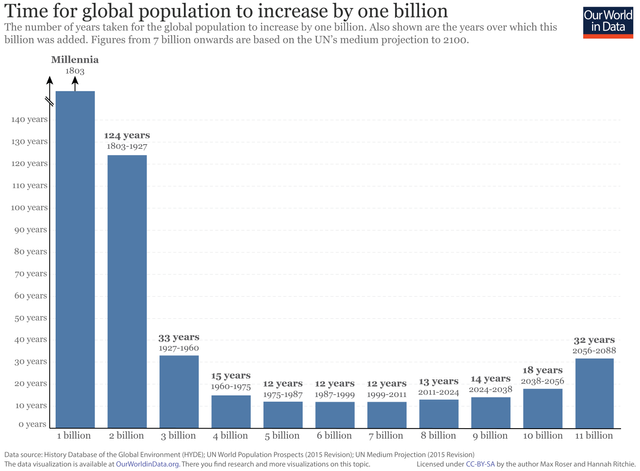
The highest annual growth rate of the human population was decades ago: between 1962 and 1963, peaking at 2.2% per year. Since then, the growth rate is ever decreasing. Some countries like Russia and Japan have even a negative natural growth rate, meaning their citizens having more deaths than births, which will eventually lead to their extinction in a very far future and without taking migration into account.
Some might now argue, that this decline in growth rate is only something which can be seen in developed countries, since we all know, that poorer countries have increased fertility rates in comparison to their richer counterparts. In fact, this argument is indeed quite popular among many people who are critical towards immigration from these poor regions into richer ones.
If only it were true.
The current trends seem to indicate the exact opposite: every region, no matter if developed or not, will experience a continuing decline in growth rate.
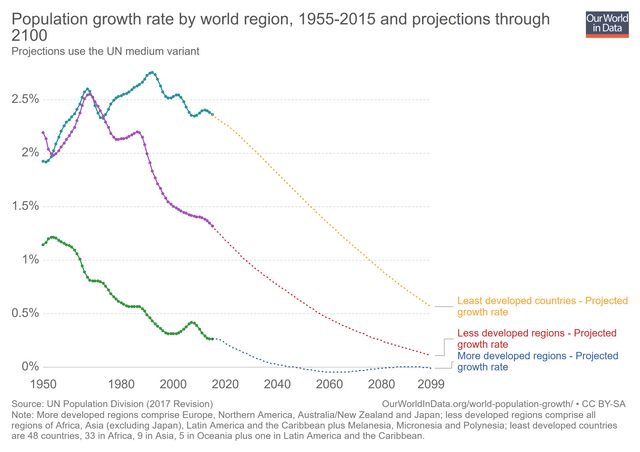
There are many reasons for these trends. Against popular beliefs, the dominant religion of a country or its respective people is among the least crucial factors which are contributing to their fertility and therefore their growth rate.
According to a paper by Timo Wacker this can be summarized as follows(9):
It was shown that the religious affiliation of a family - in contrast to household income, the substitution behaviour with rising income, the mortality rate and other social and societal factors - has only a small influence on the actual fertility of this family. While for the other factors a direct correlation could be proven theoretically and practically, the analysis of religion has shown that on average there is no significant difference between the fertility rates of different religiously influenced countries due to their religion.
Translated with the author’s permission from German to English.
This conclusion holds true as soon as you take a closer look at the available data. There is a lot of fearmongering going on when it comes to immigrants from Islamic countries. A very popular argument is, these immigrants are going to produce as many children as they used to, when they were back in their home countries. Being a hardcore atheist, who happens to have a decent education in economics and psychology I found this always hard to believe. Especially considering the fact, that undeveloped countries with either a Muslim or a Christian majority are currently the ones which have the highest fertility rates. So, it’s not only one specific religion, but at least two.
But, as stated, compared to other factors, religion is relatively insignificant.
To put matters into some perspective, we can cite Max Roserref:
In Catholic Italy the fertility declined from 2.5 in 1966 to 1.2 at its lowest rate in 1997, and in Muslim Iran the fertility declined from 6.5 children per woman in 1982 to 1.8 in 2005!
So, what are the factors, which are most important regarding fertility rates?
As stated by Wacker, some of these factors are mainly household income as well as (child) mortality rate. The latter is quite logical on its own: if parents don’t have to fear that their child will die during its early years, they don’t need to produce so many to ensure to have at least some offspring. While in the 18th century more than 40% of all children died(10) during their first five years, this number has decreased to only 4.25% in 2015. Needless to say, the number of births per woman has also decreased significantly.
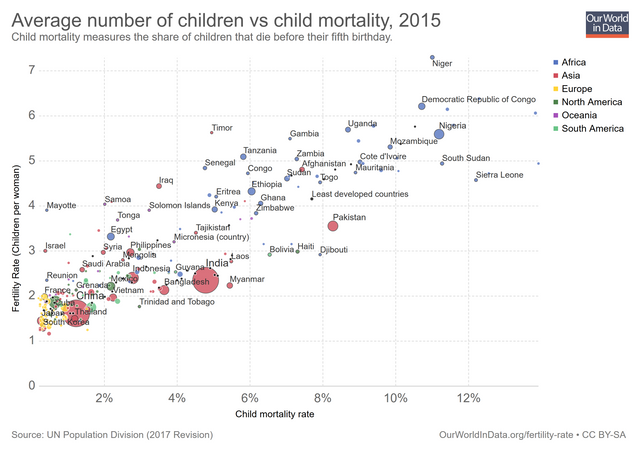
In addition to increased income and decreased child mortality, I want to point out another factor which contributes to fewer children: empowerment of women.
This means in general a better education and healthcare for women, which can then lead to them producing fewer children on average.
As some of you may know: I hate children. I think of them as annoying and pesky, little brats – therefore, I’m a feminist for my own good. The better women are off, the lesser the risk for me having to deal with children.
Some authors are even arguing that education is the most important factor for demographic change of all(11). And the available data seem to support this idea, since in countries where women had initially an education of about zero years, which later changed to something around six years, the fertility rates declined by about 40%. What a bliss.
The world is getting better, not worse
So, here we are. I tried my best to provide you with some convincing evidence, that the current state of the world is by far way better than most people actually believe.
We have enough food and resources to host more people and the growth rate of the human race is declining every year. With more income to spend, better education and healthcare this will most likely only going to increase (although there are some authors who argue otherwise(12)).
Humans are getting older, richer and better educated all around the globe – eventually, the transhumanistic dream will come true at some day and the fact of death will only be a mere choice. That could become interesting.
Speaking of dreams: there is something I haven’t really talked about during my extensive display of different factors, theories and statistics – human ingenuity.
The human race has always used its cleverness to harvest more resources from its environment than any other animal could ever dream of. We invented so many technological advances which ultimately led to us being the dominant species of this planet. One could easily argue, that we actually never lived in peace and harmony with mother nature, because we were always searching for new and different ways of making the most out of our surrounding environment. I’m still waiting for a pyramid-equivalent built by chimps.
So, even if the number of humans inhabiting this planet is increasing, I am very confident, we will find more ways to deal with them properly. Scientific progress has led to better food, better healthcare, cleaner water and so much more for everybody.
It is for this reason, we should always cherish facts and data – not feelings and fears.
Feel always free to discuss my ideas and share your own thoughts about the things I’m writing about. Nobody is omniscient and if we all walk away a bit smarter than before, we’ll have achieved a lot.
Thanks for reading and stay sceptical.

Make sure, to check out #steemstem for more science related content.
References
(1) The Myth of Overpopulation
(2) Thomas Robert Malthus
(3) Malthusian Growth Model
(4) Food for 10 billion people
(5) Food trends
(6) Water trends
(7) Growth rates
(8) Fertility rates
(9) Wacker, Timo. „Droht Europa eine demografische Islamisierung? – Eine familienökonomische Betrachtung“. 2016. Martin-Luther-Universität Halle-Wittenberg
(10) Child mortality
(11) Murtin, F. (2013). “Long-term determinants of the demographic transition, 1870–2000.” Review of Economics and Statistics, 95(2), 617–631.
(12) Reverse Fertility Declines
Debunk-Tuesday

You made many interesting points here, some of which I wasn't aware of. But I think I disagree with the gist of this post.
For example, you mainly argue that overpopulation is harmless by taking three approaches. One approach is to say that the Earth isn't a closed system.
I want to be practical about this: space colonization is sci fi at this moment. And we aren't doing much about solar energy.
Two, you say people, in order to grow, need just food and water.
True, but, again, let's be practical: you think the rich are just going to equally distribute all their wealth? I don't see that happening now, so I've no reason to think it will happen in the future. Death and war are more likely, I think.
Your third approach is to say that people are in fact having less children. I agree with this, and it's why I think a true appreciation of the issue of overpopulation involves the realization that it's really a two-pronged problem: on the ONE hand you have overpopulation, and on the OTHER you have the bankrupting of the entire economy if the opposite of overpopulation ensues, i.e. if the average population keeps getting older because of better healthcare coupled with lowering fertility. There's no way (according to economists) the young population can sustain the increasingly older population.
Well, there IS a way, and it's called defeating aging by means of scientific immortality, but that's another topic altogether! You mention this in your closing paragraph, even mention the fact that the world is getting older and the natural follow-up to that is the transhumanistic movement, but I don't think the reader who doesn't already know about this stuff appreciates how that relates to the rest of your argument in the post.
I also agree with your meliorist stance at the end of the post: human ingenuity. I too am hopeful, and even positive, that it will solve our issues. But that's long-term, and in the meantime we might screw things up for a lot of people.
Thanks a lot for pointing out some issues with my approach.
I am quite aware, that I should have extended this post and included more quality of life aspects.
At least in the German adaptation of that post I included an update to clarify some of the problems with the used data and missing information. I will maybe write a follow-up post about this topic in the future in order to address some of these issues, many people pointed out.
Personally, I don't think that is going to happen. Judging by the data regarding the number of violent conflicts and relative death tolls, we are still living in an incredibly peaceful time. I don't think, wealth needs to be redistributed, but with more and more ways to produce cheaper goods, the overall quality of life will increase. This is something, which already seems to happen in many countries.
Again, this is most likely true. But this is not so much an issue of demographic change but a flaw of the way societies take care of their older population. In Germany, for example, this is mainly done by laws and taxation - which, of course cannot work out, since the mere numbers don't add up anymore. I think people need to be more aware, that there best shot is to invest their own money wisely, so they have something to live on as they grow older. The state policies are only going to fuck things up.
Yeah, you are right. And, in fact, you just gave me a reason to write a series about transhumanism as well. Thanks a lot for increasing my (quite long) bucket list :D
Steven Pinker made it adequately clear I think that the world is improving on a number of measures, so I'm with you on being positive about the future.
I'll be looking forward to your transhumanism series!
Hey @alexander.alexis
Here's a tip for your valuable feedback! @Utopian-io loves and incentivises informative comments.
Contributing on Utopian
Learn how to contribute on our website.
Want to chat? Join us on Discord https://discord.gg/h52nFrV.
Vote for Utopian Witness!
Nice post!
This is quite awesome. I have always say that the problem of the world is not overpopulation nor inadequate resources. The problem is greed, corruption and mismanagement.
Even though the bulk of the blames goes to the leaders of developing/underdeveloped countries, the developed countries designed the blueprints and facilitate the execution of corrupt practices in the former. Take for example the Nigerian situation where one of the former military head of states stole billions of dollars and harboured it in Switzerland. The said amount of money would have successfully run the budget of Nigeria for at least, 5 solid years. Up till I'm typing this, after the death of the HOS and the discovery of the loot, the pilfered money is yet to be returned by the Switzerland government despite several attempts by successive Nigerian governments. How possible is it for such a huge amount of money to be moved from one country to the other without diplomatic missions being involved?
This is just one of several examples. A lot of politicians in developing countries steal the resources meant for their people and invest same in foreign, developed countries, duly aided by the government of such countries (how else can a foreigner invest huge amounts in your country without your knowledge?). Alas, the developed countries would be the first to accuse and blame the developing countries for being poor. The world population vs resources of a thing is more of a political issue than a scientific issue. I could go on and on but I don't want to use my rant to tarnish a good post.
Yeah, I agree - corruption is one of the biggest problems when it comes to factors which are preventing countries from advancing. There are many scholars who are arguing to end any foreign aid by governments, since most of it will never reach the people it was intended for. If I recall it correctly, I read somewhere that private institutions like the Bill and Melinda Gates Foundation are way more effective when it comes to actual help and change of people's lives.
I think that strongly depends on the country and project you're looking at. Sometimes, "help" is a synonym for buying access to resources via corruption. And yes, private institutions are doing that as well - maybe even more open than states. The oil companies have their reputation for a reason.
And sometimes it's really help. You mentioned the Gates Foundation, which is a good example for an altruistic private institution. But than there's also the public funded programmes of the UN, or single countries' initiatives. E.g., the Republic of Austria funded the construction of water power plants in Bhutan, whithout expecting anything back (my father was involved in the project as an engineer).
Overpopulation is not about the food, it's about the quality of life.
There are 7.000.000.000 people and 300.000 wolves, 75.000 leopards and 7.000 cheetas. Should there be 70b people and 7 cheetas?
It's also about the simple things, like traffic jams. But we will build new roads, and make further partition of habitats. So... I don't care it Europe can sustain 5x more people if we screw everything else.
How wide is the lens? lf you are comparing poor countries vs rich countries you are right. But take some data about Kosovo, the is a clear statistics for every decade. BTW, France has no such stats.
Assimilation... Are they ever going to eat pork? Why do you think they would change other customs. What is the most common baby name in FRA, DEN, NED? Have the Gypsies assimilated after 1000 years in Europe? Did they get equally educated? Fertility rates?
Now, why you think this class will integrate?
Probably... But who claims that edu. will be equal between those ethnicities?
Again, the extreme. What is happening once we have almost 100% with a highschool+ ?
Food plays an enormous role in people’s quality of life @alex1320. It all begins with it, how healthy, and possibily productive as well as prosperous they will be. Lack of food will lead people to commit crimes, to beg and so forth. So, abundance of food does have an important part to play when it comes to overpopulation.
Neverheless, I couldn’t agree more with you when you adress infrastructure (eg. traffic, housing). I have just recently watched a documentary on a project that is taking place in London called ‘The Super Sewer’. The documentary wasn’t about overpopulation, but it showed the overwhelming amount of waste produced in a city like London, whose sewer system was inittialy built to deal with the waste of 2.000.000 people and now has 9.000.000.
Indeed the ingenuity of men and the decreasing rate of births may delay the recurrence of such problems. As the post sugests. But, whenever I hear about overpopulation, like you, my thoughts tend to drift more towards topics like the impact we have on the planet itself. For example, the toll progress takes on natural environments.
I enjoyed reading your comment :)
This is why I <3 Steemit, the debates :)
Me too 😊
No more time for debates at this end due to early start tomorrow :p
Take care Alexs!
2 late 4 tea
I find the presented facts very interesting and indeed, they are somewhat in contrast to common beliefs.
BUT: If you want to debunk overpopulation, you will have to look at many more factors than just food and water. As @alexs1320 pointed out too, it's not just about the question if we are theoretically able to feed 10 billions + people, it's also about how these people are living.
If all those people want to have a Western standard convenience life (which they want), earth simply cannot provide enough resources. Not with the current state of technology. And yes, while some resources are not limited, others are. This includes energy, as even solar panels and accumulators use valuable limited resources.
Also, food production for 11B people comes at a terrible cost for the environment, which is not just bad from an environmental point of view, but also leads to the depletion of other renewable resources - clean, carbon-low air, in particular.
I would probably have to write a full contrary opinion post on this for a good discussion... And I don't know if I can bring myself to that amount of work.
Anyway, interesting stuff!
This is an excellent, well researched post Ego :) , and after reading all the comments you left on your feed I don’t have much to say. But, I would like to let you know that this post has acctually debunked a misbelief a had regarding water distribuition. Also, thank you for sharing the website ‘Our World in Data’ here.
I am looking forward to seeing what you will be writing about immigration. This is a topic that interests me very much. Perhaps, because I have been an immigrant for most of my life!
Lots of love from Portugal to you Ego ❤️
This article is generating some excellent debate :)
I suppose us humans can weather any problems brought upon by overpopulation and the proportion of people that are starving or have a low quality of life will remain event. However, I have to imagine that the environment will suffer while we persevere.
Great post, as always! I enjoyed this debunking series so much.
Yeah, like many other things, distribution is always an issue.
The question here is more what humans are doing with their water supply (i.e. polluting them, wasting them, etc.). Whilst water may be available, this could be different for proper water soon or later. I actually see more water as the seed of the next world war, to be honest. But there is no scientific ground on that statement. Just my gut feelings.
Thanks a lot :)
You are probably aware of the debate which was sparked about the quality of the used data, especially when it comes to extrapolation and following assumptions. Therefore, I even if current trends seem to indicate a decrease in growth/fertility, these will not necessarily continue. But as far as I'm concerned, it's at least one possibility which might not be too far from the truth.
Hm. Yeah, that's the fear of many people. Personally, I think it's more likely we will find more efficient ways to transform water sources like oceans in a way humans can actually drink it. As far as I know, this process is currently quite expensive - if we manage to make it cheaper and find ways to transport it over large distances, conflicts could be avoided.
I agree with you, but the time scale is not clear. Dunno which one will come first. We a re probably talking about a couple of decades in both cases :)
Congratulations! Your post has been selected as a daily Steemit truffle! It is listed on rank 13 of all contributions awarded today. You can find the TOP DAILY TRUFFLE PICKS HERE.
I upvoted your contribution because to my mind your post is at least 24 SBD worth and should receive 167 votes. It's now up to the lovely Steemit community to make this come true.
I am
TrufflePig, an Artificial Intelligence Bot that helps minnows and content curators using Machine Learning. If you are curious how I select content, you can find an explanation here!Have a nice day and sincerely yours,

TrufflePigHi @egotheist!
Your post was upvoted by utopian.io in cooperation with steemstem - supporting knowledge, innovation and technological advancement on the Steem Blockchain.
Contribute to Open Source with utopian.io
Learn how to contribute on our website and join the new open source economy.
Want to chat? Join the Utopian Community on Discord https://discord.gg/h52nFrV